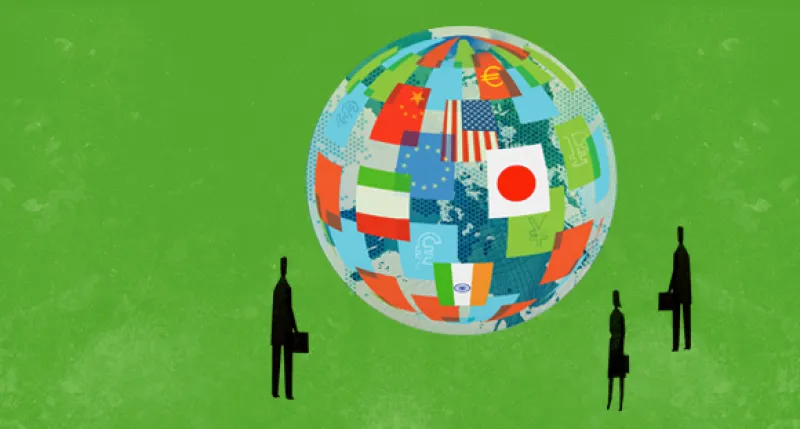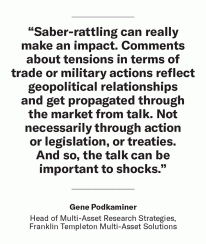In the following conversation, two key players at Franklin Templeton Multi-Asset Solutions –Wylie Tollette, Head of Client Investment Solutions, and Gene Podkaminer, Head of Multi-Asset Research Strategies – talk through the “what if” of geopolitics, including the risk of “expropriation” and home-country bias as a “shock absorber.”
Gene Podkaminer: If you take all of the news on your Bloomberg terminal, all of the positions that you hold in your portfolio, everything that you think may happen over the next 5–10 years, and you condense it into a singularity, you get back to geopolitics.
Wylie Tollette: Maybe we start by asserting that over the long term, geopolitics are the only thing that matters, in a sense. Economies and capital markets are an outgrowth of what happens geopolitically. The big macro factors – economic growth, inflation, and interest rates – are each a result of what happens geopolitically. The trick is separating important trends and changes from shorter-term noise.
Podkaminer: We have to force ourselves to think about extreme scenarios. For example, in the U.S., growth rates are not bad. Inflation is relatively low. Interest rates are fairly stable. That’s all good.
Tollette: We don't have to go too far back to see how all that can flip on its head. In the ’60s and ’70s, or back to World War II or World War I, geopolitics – particularly the differences between First, Second, and Third World countries – though, we don’t use those phrases much anymore –dominated the narrative. Geopolitics drove growth. Geopolitics drove inflation. Geopolitics drove interest rates.
Podkaminer: If you’re a CIO, you absolutely want to understand what kind of geopolitical environment we’re in. What issues might arise over the next 5–10 years, or any time during your investment or results horizon? Of course, it’s impossible to know what trade tensions we’ll be dealing with in 2024 or 2034. Or what global allies and enemies might look like, and how central bank policies might reflect that.
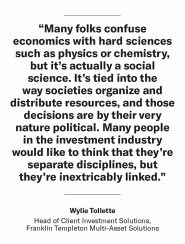
Tollette: Many folks confuse economics with hard sciences such as physics or chemistry, but it’s actually a social science. It’s tied into the way societies organize and distribute resources, and those decisions are by their very nature political. Many people in the investment industry would like to think that they’re separate disciplines, but they’re inextricably linked.
Podkaminer: It’s really political economy.
Tollette: Many economists would like to still believe that they’re separate endeavors, too. At the end of the day, political winds of change are important to investors in the way they affect those macro drivers Gene mentioned – and they can affect those macro drivers in fundamental ways.
If you look at the early part of this year, one of the worst-performing sectors in the U.S. was health care. Why? Because Democratic candidates for president in 2020 – nearly two years away – were all talking about large changes to the delivery of health care in the U.S. That’s an example of very short-term politics influencing short-term stock price behaviors. Has it impacted economic growth fundamentally? No. Has it impacted interest rates? No. Has it impacted inflation? No.
Podkaminer: The kind of funny thing about politics is the talk. Just talk, talk, talk, without much action. But it sets the stage for what’s to come in legislation or regulation. Regulation is the government putting its money where its mouth is – it’s when they say, “This is how it’s going to be. These are now the new rules.” We need to play within those rules. With regulation, the game can really change very rapidly.
Tollette: Whereas there’s a lot of uncertainty when it’s just political talking, right? You have to figure out how you’re going to handicap it. Once legislation has passed, it’s a matter of understanding what the new rules mean, and how they’re going to impact different industries, sectors, and investments.
Podkaminer: But the talking part is important, too, because saber-rattling can really make an impact. Comments about tensions in terms of trade or military actions reflect geopolitical relationships and get propagated through the market from talk. Not necessarily through action or legislation, or treaties. And so, the talk can be important to shocks.
Tollette: It can be. Ultimately, the economy is a social construct. We’re all individual actors in a much bigger system. Geopolitics is how that’s governed and supported, or not. Markets clearly react to what happens geopolitically, and they should.
Podkaminer: The question is figuring out what’s important. And I think partially what’s important is in your time horizon. If I’m an asset manager, maybe my time horizon is a quarter or a year. If I’m a trader, my time horizon is probably a lot less than that. If I’m a CIO, perhaps my time horizon is much longer than that – three years, five years, 10 years or more.
There may be an inverse relationship between the magnitude of the implications for what happens geopolitically and my time horizon. What I mean by that is: if I am a trader and my time horizon is one day, some tremendous geopolitical surprise would need to happen in that one day in order to really matter to me.
Tollette: But with a five- or 10-year view, the subtler things like jockeying across countries with capital flows, trade negotiations, and immigration policies get factored into the longer time horizon. And then it’s the task of filtering out what’s actually important, and the implications.
Podkaminer: It’s not fair to ask every CIO to be a mini Secretary of State and understand what’s going on globally. But they should have some idea about how big-picture geopolitical relationships drive the factors in their portfolios.
It’s easy to get lost in geopolitics; it’s very seductive. Over the long term, markets do follow macro factors driven by geopolitical trends, but it’s not instantaneous. It’s akin to currency. For example, a report might cross your desk that the Japanese yen is undervalued against the euro. That’s really an abstraction – maybe it’s about ongoing demographic change in Japan. Maybe it’s the tax regime. Or manufacturing and trade. How does the flipside of that in Europe influence the yen-euro relationship? Instantaneously, there can be currency mispricings that don’t adhere to purchasing power parity or any of the metrics that economists advise. Everything equilibrates in a way over the long term, so our perspective and our starting point matter. If you’re just digesting the news cycle, it’s hard to zoom out and appreciate how the pieces fit together, how to filter out what’s actually important, and what the implications are. If I’m running a portfolio that is heavily exposed to economic growth, and maybe not that exposed to interest rates or inflation, I’m focusing on things that really, really rock growth. If I’m a liability-aware investor, I have more exposure to inflation and interest rates, and am more concerned with how central banks solve policy dilemmas, and how they start to calibrate inflation and interest rates based on the geopolitical issues.
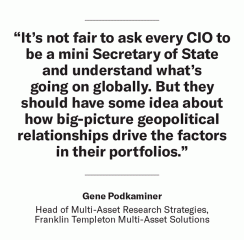
Tollette: A useful construct for examining geopolitical events and their potential impacts is first to consider whether it’s a global or local shock. For example, the rise in populism today is global and appears to have staying power. This is not the first time that’s happened. It seems to follow big financial crises, like we had in the early 1930s and again in 2008. That’s the type of geopolitical event that long-term, multi-asset class investors should care about. How is that going to potentially impact my portfolio? What should I do to prepare myself for that type of impact?
Brexit, on the other hand, is a local phenomenon. It has some potential impact on Europe, but the U.K. is frankly not a tremendous chunk of global multi-outlet portfolios. It’s a chunk, but it’s not like the U.S. or China. Brexit is a fairly well-defined event, with a fairly constrained time frame.
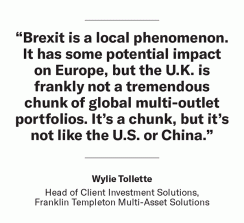
Podkaminer: Another way to think about Brexit, though, is as a result of the fuzzily defined populism movement. It’s pretty clear that migration and immigration – demographics – is an underpinning of populism. Immigration is either at, or very near, the top of issues with folks that voted to leave the EU. Maybe we’ll look back 10 years from now at Brexit as an independent event, maybe not.
Tollette: Gene’s right. You have to look at local events to detect if they’re a symptom of something broader that could begin spreading. Like if Spain decides to drop out of the euro, or Italy decides to drop out of the euro. It would be a major geopolitical event if the euro, a large currency experiment that’s going on now for 20 years, starts to fall apart.
Podkaminer: Which is really different than, say, Catalonia leaving Spain.
Tollette: And as Gene said, demographics are underneath the surface of politics. In particular, the continued movement of people from rural communities into cities. The rural versus urban divide seems to be getting more dramatic. It influenced Brexit, populism, the Trump phenomenon – it’s happening in Russia where huge swaths of the Asian continent are literally depopulating. Just giant chunks of land have no people on them.
Podkaminer: So, it’s not a surprise that these demographic and geopolitical tensions are baked into the systems that govern countries. Understanding the genesis…
Tollette: Genesis! That’s really going back into history!
Podkaminer: Not that far back – but it is important to understand that the flavor imparted by the origins of a political system can help us understand how it proceeds going forward.
Tollette: Absolutely. And the way a system helps constrain or accelerate capitalistic behavior is crucial to the way markets work.
Podkaminer: That’s not always the case with emerging market countries. What if the government in an emerging market country appropriates the assets of a company? In other words, the government expropriates what actually belongs to shareholders or the business. You can unpack that lots of different ways regarding the rule of law, and property rights, and so on, but ultimately it comes down to “Who owns this stuff?”
Tollette: I think that’s a reasonable risk to take for many investors. That’s why a multi-asset class investor has perhaps only 15-20% of their assets in the emerging markets. We think in terms of core and satellites. The core should be in assets where you have low risk of expropriation, and you’re confident that the capital rewards from the equity-risk premium are going to accrue to you.
Podkaminer: This suggests the rates of return for more developed countries, by definition, will be lower with relatively higher returns in emerging markets. This is the proper time to emphasize each emerging market is different in its own way. You can argue that all developed markets are similar in their own ways, too. Not to say that they don’t have some important differences, but when you look at an Indonesia versus a Vietnam, versus an Argentina versus a Turkey, you’d say there are tremendous differences across those markets from a geopolitical perspective. If you look at a Canada versus a U.S., versus a Germany, less differences there, right?
Tollette: Yes.
Podkaminer: The way you seek to balance risk and return in a multi-asset portfolio among equity, fixed income, and alternative assets really does come down to your geopolitical assessment of the future. If you think you’re going to be in a relatively calm and peaceful period, maybe that’s a time you move away from the core a little bit and add more satellite – you’re more risk-on. In contrast, if you’re in an environment where everything around you is volatile, then retreat a little bit because you can’t really tolerate the kind of risk that comes through the satellite investments. Because that will also, by definition, vibrate aggressively in the core investments.
If we do see the complete collapse of an economy, it will likely be an emerging market country. It’s hard to imagine, at this point, that a developed market economy would collapse into itself. With an emerging market country, in our view, it’s probably not going to happen all at once. You’re going to feel the pre-shocks, and hopefully it’s not a huge part of your portfolio because it is a satellite rather than part of the core. The shock may be large, but its weight in your portfolio may be small. As a prudent CIO, with good diversification across geographies and assets, you should probably be okay. That’s not to say that it won’t hurt, but it’s a far cry from thinking about the collapse of a country like the U.S., Japan, Germany, or France.
Usually, you can see trade-related shocks coming, too. Again, it’s about separating what’s talk from what’s actually important. We’ve had some interesting trade talk and action over the last two years that’s had some unexpected consequences and a little bit of rationalization as well. Usually, you can prepare yourself based on what countries and what industries you think will be impacted. A CIO can’t be expected to get down to that level of minutiae, but that’s why they tend to hire staff or active managers to assess implications, and position their portfolio in a way to take advantage of – or at least not be hammered by – trade relations.
Tollette: Overall, what we’re saying is that you should focus on longer-term, global geopolitical implications. Potential local geopolitical implications should be a small part of your portfolio, and a small part of your mental accounting for how you spend your time.
At the risk of extending this geopolitics discussion, let’s spend a moment on home-country bias. In small countries, the efficient market hypothesis would say they should only have a tiny amount in local assets.
Podkaminer: Maybe geopolitical situations cause home-country bias so we have more of our assets in local investments than market weights would suggest. That’s independent of the size of the country. If you look at portfolios in Luxembourg, they tend to have a lot of Luxembourg equities and fixed income.
Tollette: It’s a tiny country.
Podkaminer: I think home-country bias is a fascinating example of what you mentioned earlier, Wiley, namely that economics isn’t necessarily a hard science. It’s based more on psychology and behavior. Home-country bias is just a manifestation of that.
Tollette: On the fixed income side, this ties into liability structure. Most people have to pay their bills in the local currency supported by the local political structures. Vietnamese have to pay their bills in Vietnamese dong. That currency, by its very nature, is actually a political construct. Fiat currency is only valuable because the government says it’s valuable. When you have a fixed income portfolio with home-country bias, that makes perfect sense. Because it’s a shock absorber to paying local bills.
Podkaminer: To push on that a little bit, you may see 40% or 50% of equity assets in the home country. If you’re a true total return investor, you don’t care where your cash flow is coming from. Whether it’s a coupon payment, or a dividend, or you’re actually selling stocks or bonds.
Tollette: Right, theoretically you don’t care. But, in reality, having to sell something introduces timing risk into your investments, particularly if you have regular cash demands.
Podkaminer: So, how do I look at a portfolio that is potentially globally distributed across equities and fixed income while making the economic argument that my equity portion should be allocated like the capital markets and my fixed income is not? We do know that currency risk is a much larger factor for total fixed income, than it is for equities. Holding local fixed income protects from the currency fluctuations. Although, being exposed to the monetary policy and the business cycle of different economies is diversifying.
Tollette: This discussion is something that I think all investors should think about carefully. Not everybody does. The total return argument is a very appealing one. It’s going to maximize my long-term flow of return. And it sounds great. But at the end of the day, you have to pay your bills in the currency of the local political system.
Podkaminer: At some point, you’re going to have to convert whatever that foreign currency is into what you have to pay. And the rates that you convert it at can fluctuate dramatically. Do I have very few of my bills hedged? Am I counting on long-term total return to basically grow the pot of assets, then eventually convert them into the currency of my bills? Or do I start to think about that today?
Tollette: This is the main decision that long-term investors really have to think about and make over their time horizon.
Podkaminer: And like other decisions that investors have to make, it comes down to a list of tradeoffs.
Tollette: Exactly
Podkaminer: What is the cost of hedging? What do I gain by having global exposure?
Tollette: Exactly
Podkaminer: It also has to do with the cash flow status. If you’re in positive cash flow situation where you’re getting more money in every month, and you don’t have to sell things, then maybe you’re more comfortable moving more money into emerging market bonds for capital and being tolerant of that volatility.
Many investors are in a negative cash flow situation. They have to liquidate. They need currency available, in either bonds or cash, to fund local bills. Adding to that, they are much more in tune with local political and economic systems as well as regulations. So, perhaps this risk tradeoff makes them comfortable. Basically, it means cash-flow status matters to home-country bias and geopolitical considerations.
Wylie and Gene are happy to speak to you about your “what if” scenarios. Feel free to contact them at solutions@franklintempleton.com:
Wylie Tollette, CFA, CPA
Head of Client Investment Solutions
Franklin Templeton Multi-Asset Solutions
Gene Podkaminer, CFA
Head of Multi-Asset Research Strategies
Franklin Templeton Multi-Asset Solutions
More in the series "What if there are shocks to ... "

Franklin Templeton
| 
Franklin Templeton
| 
FT demographics
| 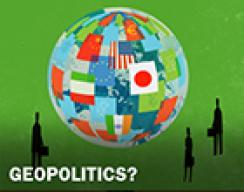
Franklin Templeton
|

Franklin Templeton
| 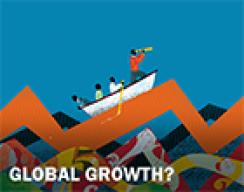
FT-global growth
| 
interest rates
| 
FT
|
Disclaimers:
This material is provided for informational purposes only and nothing herein constitutes investment, legal, accounting or tax advice. This material is general in nature and is not directed to any category of investors and should not be regarded as individualized, a recommendation, investment advice or a suggestion to engage in or refrain from any investment-related course of action. All information is current as of the date of this material and is subject to change without notice. Any views or opinions expressed may not reflect those of the firm or the firm as a whole. Franklin Templeton does not accept any responsibility to update any opinions or other information contained in this document. This material may include estimates, outlooks, projections and other “forward-looking statements.” Due to a variety of factors, actual events may differ significantly from those presented.
CFA® and Chartered Financial Analyst® are trademarks owned by CFA Institute.
For US Residents Only
This site is intended only for U.S. Institutional Investors and Consultants. Using it means you agree to our Anti-Corruption Policy.
If you would like information on Franklin Templeton’s retail mutual funds, please visit www.franklintempleton.com.
Franklin Templeton Distributors, Inc.


